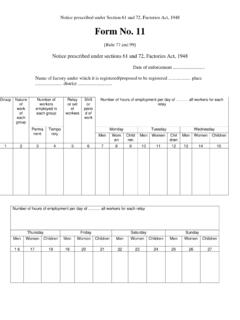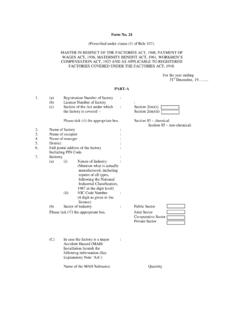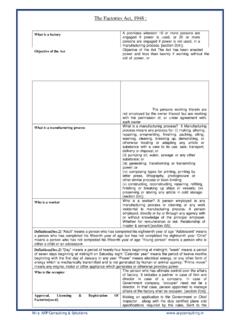Transcription of RGICS LEGISLATIVE BRIEF
1 RGICS RAJIV GANDHI INSTITUTE FOR CONTEMPORARY STUDIES JAWAHAR BHAWAN, DR. RAJENDRA PRASAD ROAD, NEW DELHI-110001 RGICS LEGISLATIVE BRIEF (July, 2017) The factories (Amendment) Bill Prepared by Nijara Deka RGICS LEGISLATIVE BRIEF The factories (Amendment) Bill 2 KEY MESSAGES Anti-worker: Doubling overtime will dilute the principal objective of the Act. The varying overtime limits given in the Bill are contradictory and can therefore be manipulated by industry. Inconsistent with the ILO convention. Strangulating job creation through doubling overtime limit.
2 Health and social responsibilities of workers could be impacted due to over work. The proposed amendment will affect more than 60 percent of the factories . On the one hand Government pushing for formalization of the economy but with these amendments they are reducing the number of workers who might benefit from formalization RGICS LEGISLATIVE BRIEF The factories (Amendment) Bill 3 PART I. Introduction factories Act is a labour legislation that has existed since late 19th Century and was initially enforced to keep a check on the condition of Industrial workers1.
3 Its prime objective was to protect the workers employed in factories against industrial and occupational hazards. It focused on regulating the working hours, weekly off, provisions regarding ladies and children. It imposes upon the owners and occupiers obligations to protect the workers. It was amended in 1911, 1923, 1935 and 1987. But the important amendments were made in 1948 , which included safety of working place & machinery, health provision working hours, weekly off, paid leave, etc. It came into force on and is applicable to whole of India including Jammu and Kashmir.
4 The last amendment to the factories Act, 1948 was made in the year 1987, wherein a separate Chapter was inserted relating to the hazardous process. However, a comprehensive factories (Amendment) Bill, 2014 including the amendments of sections 64 and 65 of the Act, was introduced in Lok Sabha on 7th August 2014. The said Bill was referred to the Department-related Parliamentary Standing Committee on Labour for examination and report, which presented its Report on the said Bill on 22nd December 2014 to Parliament, which is under examination2.
5 The factories (Amendment) Bill, 2016 was introduced in Lok Sabha on August 10, 2016 by the Minister of Labour and Employment on the ground that consideration and passing of the 2014 Bill in Parliament may take some more time, with a view to boost the manufacturing sector and to facilitate Ease of Doing Business so as to enhance employment opportunities. The Amendment Bill 2016 was passed in Lok Sabha. Now Government is planning a fresh proposal to push amendments to the factories Act to create new jobs and make businesses easy to grow3.
6 The string of amendments proposed by the union government to various sections of the factories Act have been endorsed by the Ministry to deliver on its promise to vastly improve India s position in the World Bank s Ease of Doing Business Index. But the proposed amendments go about this task by decreasing regulatory mechanisms that protect workers rights, safety and health. This would only lead to a competitive easing of norms to facilitate investment without protecting the further erosion of labour rights. 1 The first cotton textile factory was set up at Bombay as early as 1854.
7 By 1870 a large number of factories were setup at Bombay, Nagpur, Kanpur & Madras. The first Iron & Steelwork started at Bihar in 1873. Jute spinning mill were started at Rishra in 1855. By 1881 there were 5000 power looms at work in Bengal. In 1870, Bally Paper mills were setup at Hoogly & several tanning & leather factories were also setup at Kanpur which led to factory establishment existence in India. This brought factories evils such as employment of women & children at tender age, excessive hours of work & hazardous & insanitary working conditions.
8 Great need for protective labour legislations to fight the conditions of workers (especially women & children) was felt as early as 1850, but nothing was done by British Government (By this a series of factories Act was already passed in Great Britain). Occasional notes of dissatisfaction were raised by philanthropist which were led by Sorabjee Shahpurjee Bengali. In 1878, Sasipad Bannerjee laid the foundation of Bara Bazar organization for the welfare of jute mill workers. There is also a record of a strike in Nagpur Empress Mill in 1877. Textile mills in India began competing with those many in Lancashire (Great Britain).
9 As a result mill owners at Lancashire were worried. They alleged that inferior labour standards prevailed in Indian mills resulted in lower production cost & hence increased the competitive power of Indian Textile Mills. So they demanded in order to preserve competitive power increase the cost of production of mills by raising the labour standards. Thus protective labour legislations was embodied in Factory Act 1881. Thus joint efforts of philanthropist, social workers in India & Lancashire manufacturers in Great Britain resulted in Factory Act 1881 (though with different considerations).
10 [ ] 2 3 RGICS LEGISLATIVE BRIEF The factories (Amendment) Bill 4 PART II: Major Provisions The factories Act (Amendment) Bill, 2016 and 2014 amends the factories Act, 1948 . The Bill amends provisions related to overtime hours of work and the employment threshold limit of the factories respectively. The following are some of the major changes introduced by the Bill and other amendments that government planning to introduce. Power to make rules on various matters (Amendment of Section 2): The Act as it stands today permits only the state government to prescribe rules on a range of matters, including double employment, details of adult workers to be included in the factory s register, conditions related to exemptions to certain workers, etc.









